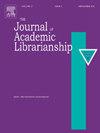Understanding first-year university student information seeking through the theory of planned behaviour: A transnational perspective
IF 2.3
3区 管理学
Q2 INFORMATION SCIENCE & LIBRARY SCIENCE
引用次数: 0
Abstract
Information literacy (IL) development in higher education requires understanding how students form their research behaviours. This is important in transnational settings, where students arrive with different expectations of academic practice. This study applies the Theory of Planned Behaviour (TPB) as a theoretical lens to analyse first-year undergraduate students' intended information-seeking actions at a British university branch campus in the United Arab Emirates (UAE). Data was collected from 151 first-year undergraduate students from nine disciplines who described how they intended to find, use, and manage information for their assignments. Well-established frameworks are used alongside the TPB constructs of attitudes, subjective norms, and perceived behavioural control to investigate students' research approaches. Data underwent a reflexive process, revealing patterns in how students navigate between the expectations of a Western academic institution and their existing research practices. Findings suggest that students demonstrating high perceived behavioural control often align strongly with institutional norms, particularly in evaluating sources and research strategies. However, many students display a hybrid approach, combining pre-university habits with newly acquired academic practices. The study contributes to understanding how students develop research intentions and behaviours in their early university experience, offering insights for targeted information literacy support.
从计划行为理论理解大一学生的信息寻求:一个跨国视角
高等教育中信息素养的发展需要理解学生如何形成他们的研究行为。这在跨国环境中很重要,因为学生们对学术实践有着不同的期望。本研究以计划行为理论(Theory of Planned behavior, TPB)为理论视角,分析了一所英国大学在阿联酋分校的一年级本科生的信息寻求行为意向。数据来自9个学科的151名一年级本科生,他们描述了他们打算如何为他们的作业找到、使用和管理信息。完善的框架与态度、主观规范和感知行为控制的TPB结构一起使用,以调查学生的研究方法。数据经历了一个反射过程,揭示了学生如何在西方学术机构的期望和他们现有的研究实践之间导航的模式。研究结果表明,表现出高度感知行为控制的学生通常与机构规范高度一致,特别是在评估资源和研究策略方面。然而,许多学生表现出一种混合的方式,将大学前的习惯与新获得的学术实践结合起来。该研究有助于理解学生在大学早期如何发展研究意图和行为,为有针对性的信息素养支持提供见解。
本文章由计算机程序翻译,如有差异,请以英文原文为准。
求助全文
约1分钟内获得全文
求助全文
来源期刊

Journal of Academic Librarianship
INFORMATION SCIENCE & LIBRARY SCIENCE-
CiteScore
5.30
自引率
15.40%
发文量
120
审稿时长
29 days
期刊介绍:
The Journal of Academic Librarianship, an international and refereed journal, publishes articles that focus on problems and issues germane to college and university libraries. JAL provides a forum for authors to present research findings and, where applicable, their practical applications and significance; analyze policies, practices, issues, and trends; speculate about the future of academic librarianship; present analytical bibliographic essays and philosophical treatises. JAL also brings to the attention of its readers information about hundreds of new and recently published books in library and information science, management, scholarly communication, and higher education. JAL, in addition, covers management and discipline-based software and information policy developments.
 求助内容:
求助内容: 应助结果提醒方式:
应助结果提醒方式:


